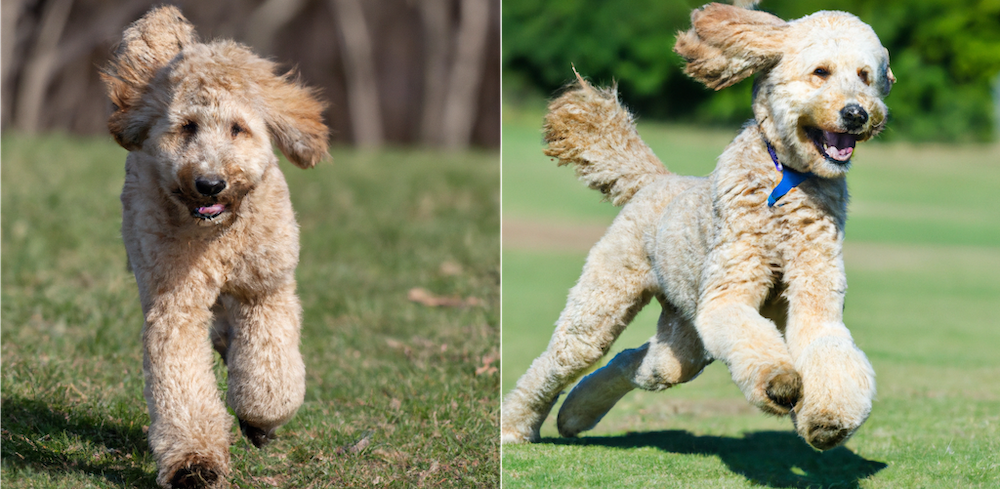Goldendoodles are a delightful and increasingly popular hybrid dog breed, created by crossing a Golden Retriever with a Poodle. Originating in the 1990s, their charming personalities, adorable looks, and hypoallergenic coats have made them a favorite among dog lovers. This in-depth breed guide will provide you with valuable information about the Goldendoodle to help you decide if it’s the perfect companion for your family.
Appearance
Goldendoodles come in various sizes, depending on the size of the Poodle parent. They can be classified as miniature (15-30 pounds), medium (30-45 pounds), or standard (45-85 pounds). Their height typically falls between 13 and 24 inches at the shoulder.
Their coat can be wavy, curly, or a combination of both, depending on the genes inherited from their parents. This unique coat is typically low-shedding and hypoallergenic, making it a great option for allergy sufferers. Goldendoodles come in a wide range of colors, including cream, gold, red, chocolate, black, gray, and even parti-colored (two or more colors).
Temperament
Goldendoodles are known for their friendly, affectionate, and social nature. They tend to be easy-going, and their gentle temperament makes them an excellent choice for families with children or first-time dog owners. Goldendoodles are also generally good with other pets, including cats and other dogs, thanks to their sociable personalities.
These dogs are also known for their adaptability, adjusting well to various living situations, including apartments or homes with yards. However, they may suffer from separation anxiety if left alone for extended periods, so it’s essential to provide them with adequate companionship and mental stimulation.
Training and Exercise
Goldendoodles are highly intelligent and trainable, thanks to their Poodle and Golden Retriever lineage. They are eager to please and respond well to positive reinforcement training, making them an excellent candidate for various dog sports and activities, such as agility, obedience, or therapy work.
Early socialization and obedience training are essential to ensure a well-behaved and well-adjusted adult dog. Puppy classes and exposing your Goldendoodle to various environments, people, and other animals will help build their confidence and social skills.
These energetic dogs require regular exercise to keep them mentally and physically stimulated. Daily walks, play sessions, and mentally engaging activities like puzzle toys, scent work, or fetch are necessary to prevent boredom and destructive behavior. A well-exercised Goldendoodle is more likely to be a well-behaved and content companion.
Health and Grooming
Goldendoodles have fewer health issues compared to their purebred parents, but they can still be prone to certain conditions, such as hip and elbow dysplasia, progressive retinal atrophy, von Willebrand’s disease, and ear infections. Regular veterinary check-ups and preventative care, including vaccinations and parasite control, are essential to maintain their health.
Their hypoallergenic coat requires regular grooming to prevent matting and keep them looking their best. Brushing your Goldendoodle at least two to three times a week is recommended, and professional grooming every six to eight weeks is ideal. Pay special attention to their ears, as Goldendoodles are prone to ear infections due to their floppy ears trapping moisture. Regular ear cleaning and nail trimming are also important grooming tasks.
Feeding
A balanced diet is crucial for your Goldendoodle’s health and well-being. High-quality dog food, formulated for their size, age, and activity level, should be fed in appropriate amounts. It’s essential to monitor your
dog’s weight and adjust their food intake accordingly to prevent obesity. Goldendoodles are prone to food allergies, so it’s important to keep an eye on any changes in their coat or skin, as this may indicate an issue with their diet.
Consult with your veterinarian to determine the best food and feeding schedule for your Goldendoodle. Some owners prefer to feed their dogs a combination of dry kibble and wet food or even opt for a raw or home-cooked diet. Regardless of the feeding method, always ensure your Goldendoodle has access to fresh water.
Pros and Cons
Pros:
- Hypoallergenic coat, ideal for allergy sufferers
- Friendly and affectionate, great with children and other pets
- Highly intelligent and trainable, suitable for various dog sports and activities
- Adaptable to different living situations
Cons:
- Requires regular grooming and maintenance
- Prone to certain health issues, including hip dysplasia and ear infections
- May suffer from separation anxiety if left alone for extended periods
- Can be prone to food allergies
Choosing a Goldendoodle Breeder
If you’re considering adding a Goldendoodle to your family, it’s crucial to find a reputable breeder who is dedicated to producing healthy, well-socialized puppies. Look for breeders who perform health testing on their breeding dogs and offer a health guarantee for their puppies. Ask for references, and visit the breeder’s facility to meet the parent dogs and observe the conditions the puppies are raised in.
Alternatively, consider adopting a Goldendoodle from a rescue organization or shelter. Many Goldendoodles end up in need of new homes due to various circumstances, and adopting one can provide a loving forever home to a dog in need.
Goldendoodles are charming, affectionate, and intelligent dogs that make wonderful family companions. Their hypoallergenic coat and friendly nature make them an excellent choice for many households. However, it’s crucial to consider their grooming and exercise needs, as well as their potential health issues, before committing to this breed. If you can provide the love, attention, and care a Goldendoodle requires, they will undoubtedly bring joy and happiness to your home for years to come.

